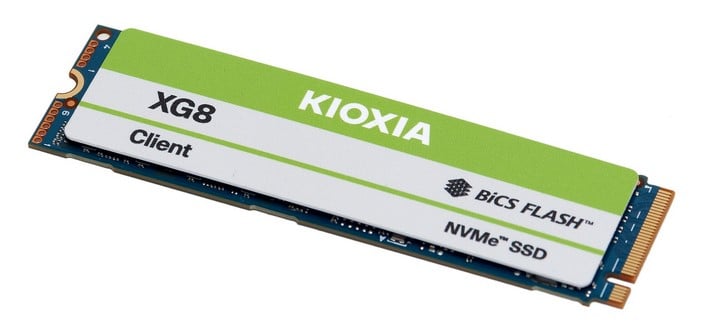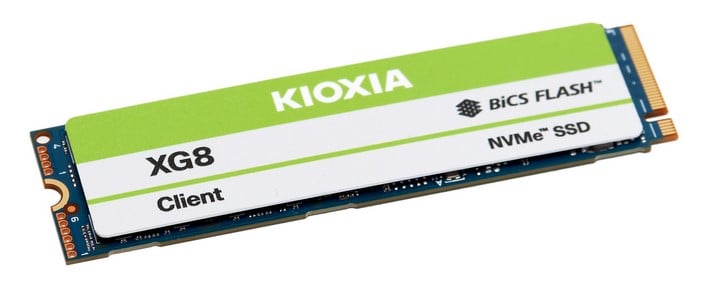Kioxia XG8 SSD Review: Fast PCIe 4 Storage For OEM PCs
Kioxia XG8: More Benchmarks, Gaming Tests And The Verdict
EFD Software's HD Tune is described on the company's website as such: "HD Tune is a hard disk utility with many functions. It can be used to measure the drive's performance, scan for errors, check the health status (S.M.A.R.T.), securely erase all data and much more." The latest version of the benchmark added temperature statistics and improved support for SSDs, among a few other updates and fixes.
HDTune v5.75 Benchmarks
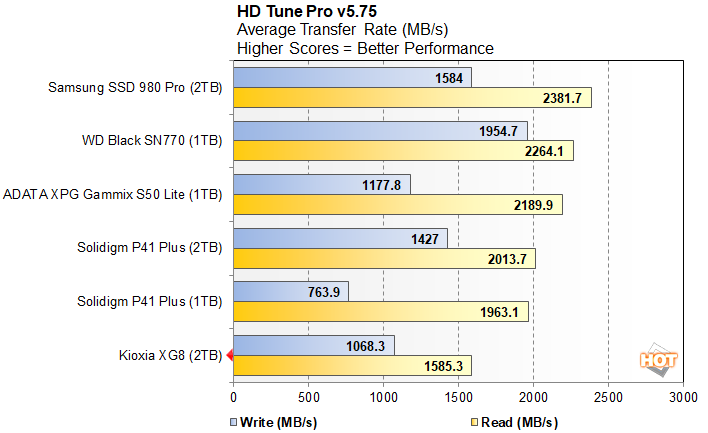
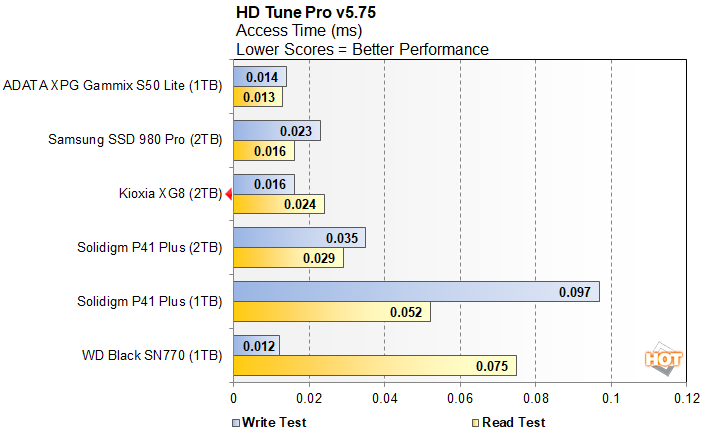
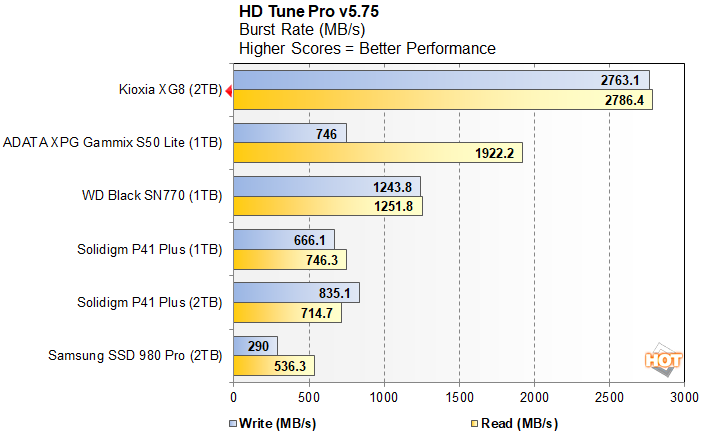
HDTune tells a very different story about the Kioxia XG8 than IOMeter and ATTO did. While the XG8 wins the burst test and scores pretty well on latency, sustained throughput fell significantly with HD Tune's workload, and as a result the Samsung SSD 980 Pro leaps ahead by nearly 50%, while the Kioxia drive brings up the caboose. It was more in the middle of the pack in sustained writes, but posted by far the slowest sustained reads.
CrystalDiskMark x64 Benchmarks
CrystalDiskMark is a synthetic benchmark that tests both sequential and random small and mid-sized file transfers using incompressible data. It provides a quick look at best and worst case scenarios with regard to SSD performance, best case being larger sequential transfers and worse case being small, random transfers.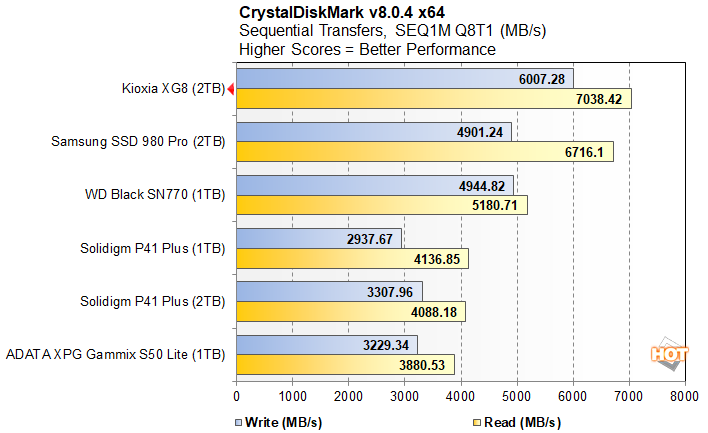
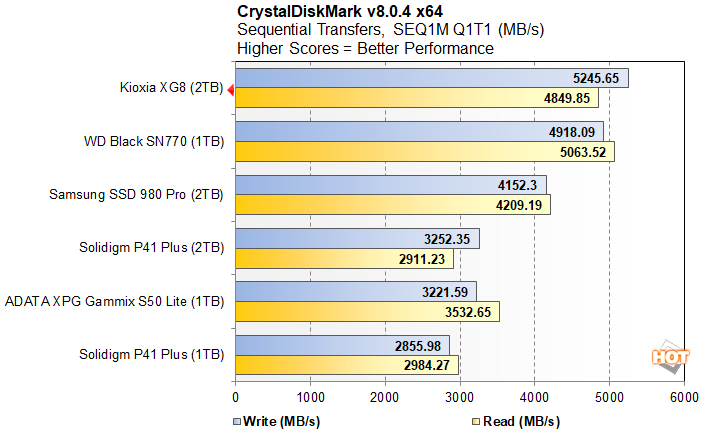
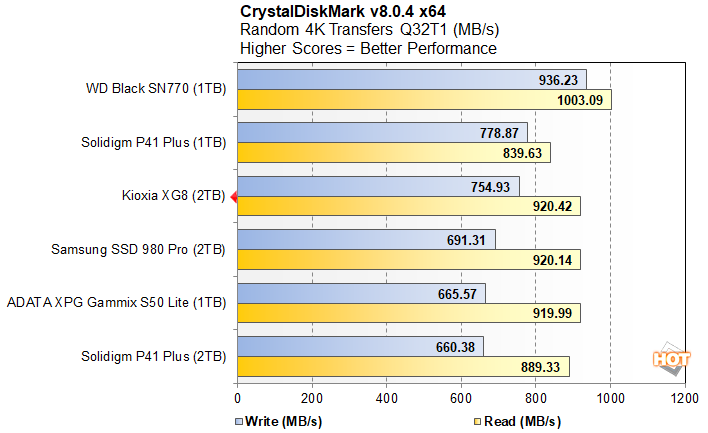
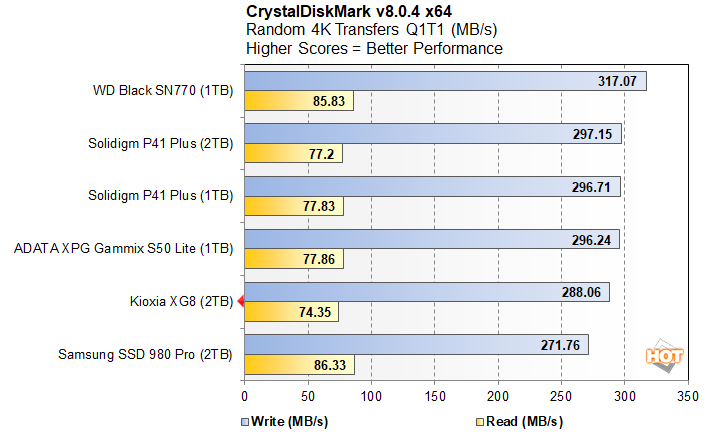
CrystalDiskMark paints the XG8 in a better light, where the Kioxia drive wins outright in both sequential writes at both a QD of 1 and 8. Meanwhile, it splits first place with the Samsung drive, winning the QD8 test. The random tests take a bit of shine off the XG8, but it still places in the middle of the pack. One down note is that it's the slowest drive overall in random reads.
Final Fantasy XIV: Endwalker Game Level Load Times
We also tested game level load times using the Final Fantasy XIV: Endwalker benchmark. This tool loads an array of different game levels during its graphics benchmark and outputs the average result when complete.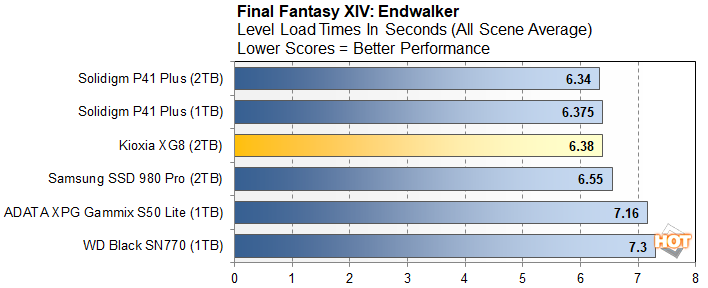
The level load time in FF XIV's benchmark puts the Kioxia in a virtual three-way tie with the Solidigm P41 Plus twins. We're talking about a 40 millisecond difference between first and third place, and the Samsung 980 Pro is not terribly far behind. We'll be interested to get a game that implements Microsoft's DirectStorage API and hopefully puts load times to bed for once and for all.
UL's 3DMark Gaming Storage Benchmark
UL recently added a gaming-centric storage benchmark to 3DMark, that leverages trace-based tests of actual PC games and gaming-related activities (like streaming with OBS) to measure real-world gaming performance in a variety of scenarios. The tests include things like loading Battlefield V, Call of Duty: Black Ops 4, and Overwatch from the initial launch to the main menu, recording a 1080p gameplay video at 60 FPS with OBS while playing Overwatch, installing The Outer Worlds and saving game progress. And finally, copying the Steam folder for Counter-Strike: Global Offensive from an one drive to another.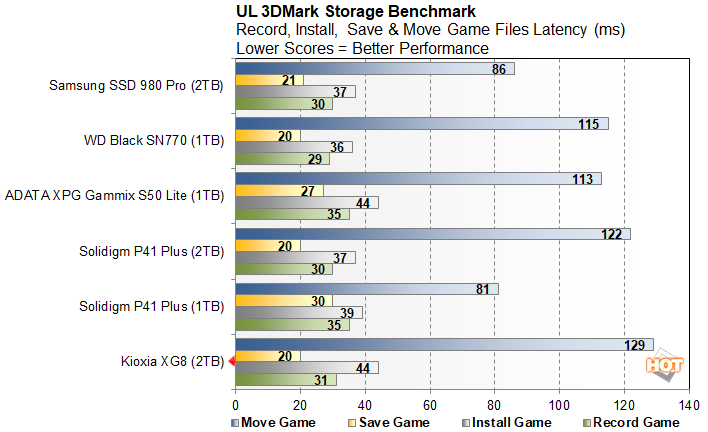
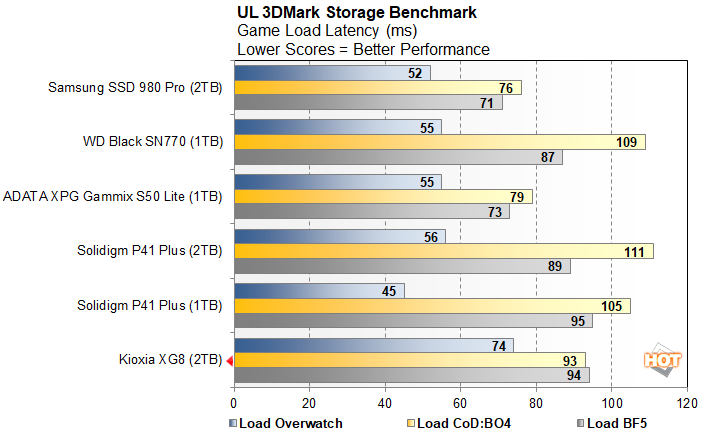
The latency exhibited by the Kioxia XG8 at the end of our charts, but if we sorted them by another test it could have jumped several spots. Because of how this test works, we have to compare test scores individually. Overall, it seems to be a pretty middle-of-the-road drive with slightly higher than average latency in this test. The XG8 seems to trail its competition by a few milliseconds in most tests, but does better in a couple, specifically the Save Game and Load BF5 tests.
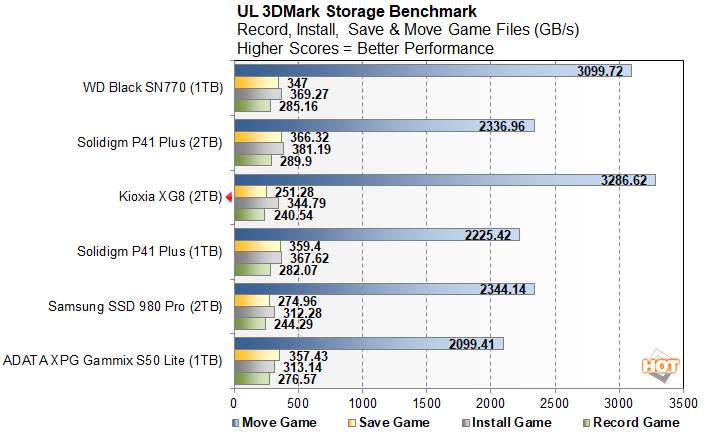
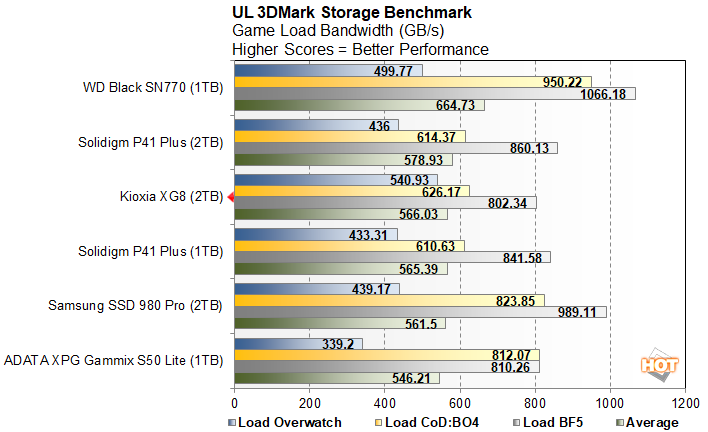
This drive's bandwidth results are much better. It hits the middle of the pack time and time again, although it does win overall in the Load Overwatch test, while bringing up the rear in the Save Game test. Unsurprisingly, different games use different methods for accessing data, and performance can be all over the map.
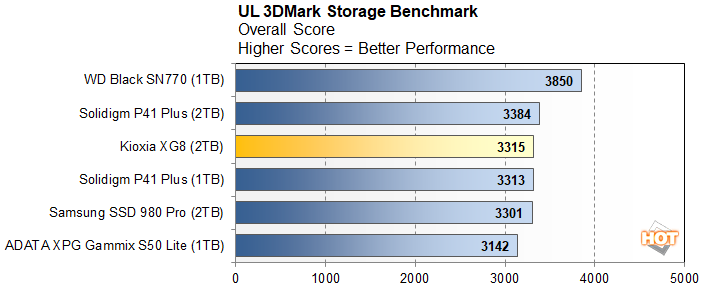
The overall score for the drive puts it in a virtual three-way tie with the Samsung SSD 980 Pro and Solidigm P41 Plus in both 1 TB and 2 TB models.
UL's PCMark 10 System Drive Storage Test
We like PCMark 10's new quick storage benchmark module for its real-world application measurement approach to testing. PCMark offers a trace-based measurement of system response times and bandwidth under various scripted workloads of traditional client / desktop system use cases.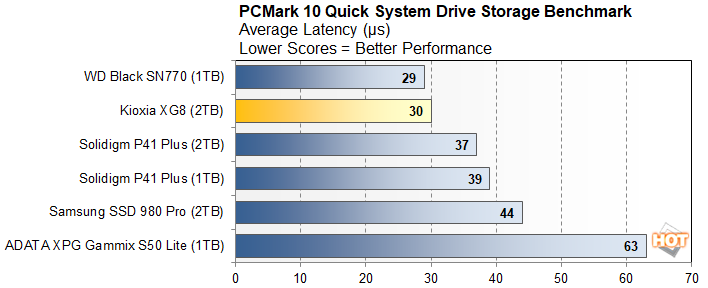
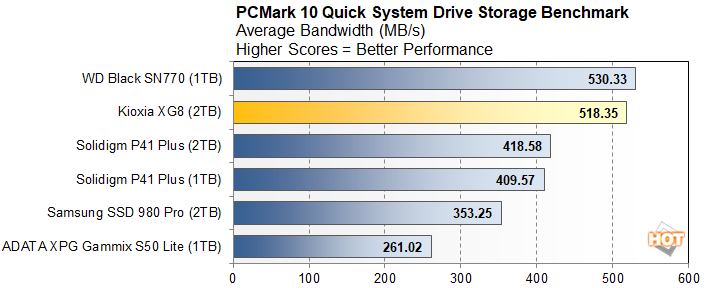
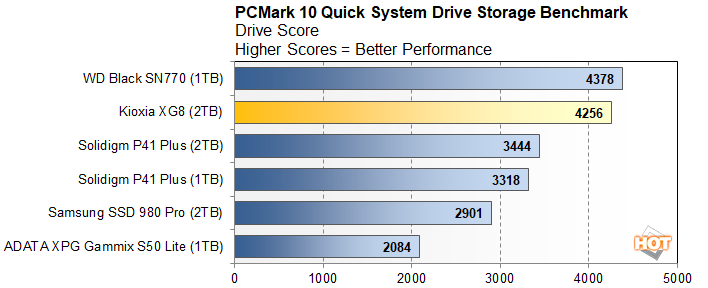
In the trace-based PCMark tests, which are comprised of a broad mix of consumer workloads, the XG8 performs well. Kioxia targets the drive as a boot drive for OEMs to integrate into laptops, desktops, workstations, and servers, so this very well may be the most important test. PCMark 10's System Drive benchmark focuses on tasks that are important for boot drives, and the XG8 does pretty well overall.
Samsung SSD 990 Pro PCIe Gen 4 SSD: The Verdict
The Kioxia XG8 is marketed to OEMs as a main drive in a whole host of high performance PC build types. The most likely scenario in which someone would have one of these drives in their system is if the manufacturer selected it. The good news is that as far as OEM-focused drives go, the XG8 is pretty nice. Overall, its performance was solid, and it particularly did well in most of our latency-focused tests, which will be the kind of thing end users will notice while waiting for data to load. It also exhibited higher-than-average bandwidth compared to other midrange PCIe 4.0 drives.
The Kioxia XG8 is an OEM-focused drive, and in the end we're not interested in retail pricing so much as the drive's standalone performance. And on that end we found that the Samsung SSD 980 Pro and WD Black SN770 were pretty comparable drives, and that's good company to keep. In short, we'd be happy to find the Kioxia XG8 in a laptop or desktop that we purchased for personal or office use. For that reason, we label the Kioxia XG8 as HotHardware Approved.


